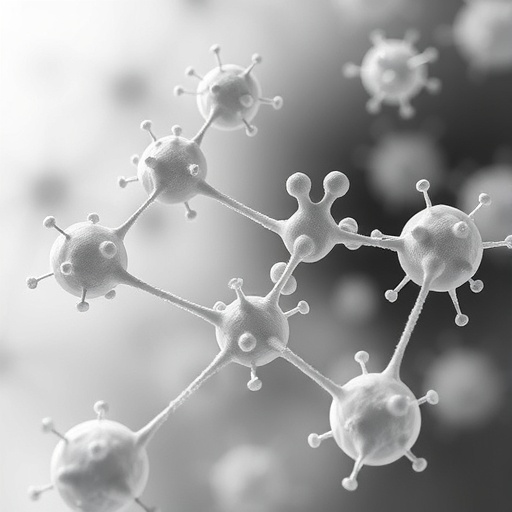In an intriguing advancement in microbial genetics, researchers have embarked on a comprehensive exploration of how Escherichia coli, one of the most studied organisms in biological sciences, responds to perfluoroalkyl substances (PFAS)—a class of chemicals notorious for their persistence in the environment. The study, led by Wintenberg and colleagues, delves into the differential transcriptional responses of E. coli during exponential growth and stationary phases when exposed to PFAS, shedding light on the adaptive mechanisms of these microbes.
The significance of understanding microbial response to environmental pollutants cannot be overstated. PFAS, often referred to as “forever chemicals” due to their resilience against degradation, have raised concerns due to their widespread presence in water sources and potential toxicity. The work of Wintenberg et al. aims to unravel the complexities of how bacterial cells modulate their gene expression to withstand the challenges posed by these substances. This study may offer insights relevant not only to microbiology but also to environmental science and public health.
At the heart of this research is transcriptomic analysis—a powerful approach that allows scientists to assess the expression levels of thousands of genes simultaneously. By comparing the gene expression profiles of E. coli under different growth phases, the researchers can identify which genes are activated in response to PFAS exposure. The findings hold implications for understanding bacterial resilience in contaminated environments and may inform bioremediation strategies.
The methodology employed in this research was rigorously designed. Cultures of E. coli were grown to both exponential and stationary phases, allowing for a comparison of their transcriptional responses. This distinction is crucial as the physiological state of the bacteria can dramatically affect their gene expression and, consequently, their survival strategies. Following exposure to PFAS, RNA was extracted from the bacterial cells to perform high-throughput sequencing, leading to a comprehensive profile of gene expression changes.
One of the fascinating aspects of this study is the observation of how the responses differ based on the growth phase. During the exponential phase, E. coli displayed heightened metabolic activity and adaptive responses aimed at detoxifying the PFAS. Conversely, in the stationary phase, when resources became scarce, the bacteria seemed to shift their strategy towards maintenance and stress resistance, a behavior indicative of survival in adverse conditions. This behavioral dichotomy underscores the remarkable adaptability of microbial life in the face of environmental challenges.
The implications of these findings extend beyond the laboratory. PFAS compounds have been linked to several health issues in humans, including immune system disruption and developmental harm. Understanding how E. coli and similar microbes respond to these substances not only helps in assessing ecological risks but also in evaluating the potential for microbial communities to mitigate contamination. Bioremediation strategies might harness these responses to develop effective methods for cleaning up PFAS-polluted sites.
Furthermore, the study contributes to the broader understanding of environmental microbiology. Bacteria like E. coli play pivotal roles in nutrient cycling and ecosystem functioning. By investigating their responses to persistent pollutants, we gain insights into how such stresses might alter microbial communities and their ecological roles. This is particularly important in light of ongoing environmental degradation and climate change, which can exacerbate the effects of pollution.
In the wake of this research, it calls for increased awareness regarding the environmental persistence of PFAS and similar substances. Regulatory measures could benefit from a better understanding of microbial interactions with these compounds, potentially leading to more effective environmental policies. Moreover, the findings emphasize the need for further research into the genetic and biochemical pathways activated in response to PFAS, which could uncover new targets for bioremediation technologies.
As we stand at the intersection of science and environmental stewardship, studies like this one highlight the resilience of life and the intricate ways in which microorganisms adapt to their surroundings. The work of Wintenberg and collaborators is a reminder of the importance of fostering a robust understanding of microbial ecology in an increasingly polluted world. These insights not only advance our knowledge of fundamental biological processes but also empower us to take informed actions towards protecting our environment.
The essential contribution of this research lies in its potential to inform both scientific inquiry and environmental strategies. By elucidating how E. coli copes with perfluoroalkyl substances, we can better appreciate the resilience of life, the adaptability of microorganisms, and the interconnections within our ecosystems. Understanding these dynamics will be crucial as we strive to develop sustainable solutions to the pressing environmental challenges posed by persistent pollutants.
Ultimately, the findings from this research pave the way for future investigations into other microorganisms and pollutants, expanding our comprehension of microbial responses in diverse ecological contexts. As we continue to face the impact of human activities on our environment, the role of microbes in mitigating these effects becomes increasingly vital. Wintenberg’s study exemplifies how investigative science can illuminate the complexities of life on Earth and guide us toward more sustainable futures.
In conclusion, the comparative transcriptomic analysis of E. coli’s response to PFAS conducted by Wintenberg, Vasilyeva, and Schaffter enriches our understanding of microbial adaptability and resilience. As we delve deeper into this fascinating field, it becomes evident that the ongoing interaction between microorganisms and environmental pollutants will shape the future of microbial ecology and public health.
Subject of Research: The responses of Escherichia coli to perfluoroalkyl substances in different growth phases.
Article Title: Comparative transcriptomic analysis of perfluoroalkyl substances-induced responses of exponential and stationary phase Escherichia coli.
Article References: Wintenberg, M., Vasilyeva, O.B. & Schaffter, S.W. Comparative transcriptomic analysis of perfluoroalkyl substances-induced responses of exponential and stationary phase Escherichia coli. BMC Genomics 26, 1016 (2025). https://doi.org/10.1186/s12864-025-12109-4
Image Credits: AI Generated
DOI: https://doi.org/10.1186/s12864-025-12109-4
Keywords: Perfluoroalkyl substances, Escherichia coli, transcriptomic analysis, bacterial adaptation, environmental microbiology.




